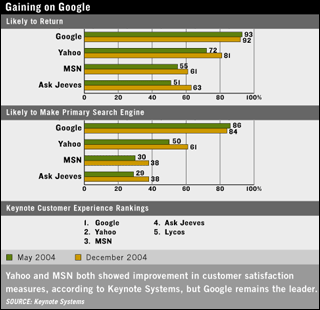January 12, 2005
Search Competitors Gaining on Google
 While Google still reigns supreme, its competitors are on the rebound:
While Google still reigns supreme, its competitors are on the rebound:
-
Google’s competitors are showing signs of becoming, well, competitive. Yahoo, MSN, and Ask Jeeves search engines are satisfying more customers, according to a study released by market researcher Keynote Systems, and a growing minority say they plan to make one of those their first stop. This means the race could finally be on in a market where “Google” is synonymous with “search.”
Google is proof that helping users tackle something as simple as finding information online can unlock much bigger opportunities. Yahoo unveiled its own search technology last February, and Microsoft joined the fray last month. Keynote’s study shows MSN pleased users by separating its paid sponsored results from its search results, bringing it in line with Google and Yahoo. That separation has led to fewer advertisement clicks, but more satisfied users that say they will return, said Bonny Brown, director of research and public services at Keynote, based in San Mateo, California.
Some other advances could have influenced the results: Yahoo followed Google and MSN into desktop search earlier this week, and both Yahoo and Ask Jeeves launched local search services, as well as short cuts or smart searches to try to give users more relevant results. My Yahoo and MyJeeves have made searches more personal. MSN also launched MSN Search Beta in November, but it was not used in the Keynote study, which involved 2,000 people selected at random. Four-hundred spent 45 minutes to an hour performing a series of tasks on one site.
Google clearly has a long head start. But the others have been making gains. According to the studies, fewer Google testers—84 percent compared with 86 percent during the first study in May—said they were likely to make Google their primary search. Sixty-one percent of those who used Yahoo said they were likely to make it their primary search, compared with 50 percent in May. MSN went from 30 percent to 38 percent in that category, and Ask Jeeves grew from 29 percent to 38 percent.
But, Google's rivals have a long way to go to catch back up. While actual search results were pretty close, the perceived quality of results leaned toward Google, so that even though they're working on a similar feature set, searchers prefer Google for the customer experience, and that's more about branding than technology. Daniel Read, product management VP at Ask Jeeves said, “We think the technology gap has more or less closed now amongst the four key players. Now the brand gap is what needs to close and you can see that is happening now.” After Google in the overall rankings were Yahoo in second, MSN in third, Ask Jeeves fourth and Lycos fifth. Local search appears to be an opportunity for Yahoo:
-
For all three top Google competitors, the future is looking brighter. That's because they all made strides against Google in key indicators of future usage, Keynote found.
When it comes to the likelihood of users to return to a search site, the likelihood for Yahoo increased 9 percentage points since May to 81 percent. The same measure increased 6 percentage points to 61 percent for MSN and rose 12 percentage points to 63 percent for Ask Jeeves, Keynote reported.
A similar pattern was seen in consumers' likelihood to make the sites their primary search engines. Google still led, with 84 percent of consumers likely to make it their primary site. But Yahoo jumped 11 percentage points to 61 percent in that category, while MSN increased 8 percentage points to 38 percent. Ask Jeeves also reached 38 percent, a 9 percentage point jump from May.
The shifting search numbers point to the tenuous nature of loyalty in the search market. Keynote estimates that half of consumers will turn to another search engine if their expectations are not met.
In the hotly contested local search segment, Yahoo showed strength. All of the major engines, except Microsoft Corp.'s MSN division, have launched sites in the past year for finding business listings and other geographic-specific information.
Yahoo gained enough traction in local search to tie with Google in that category of the study, according to Keynote. That gain came even as 22 percent of users complained that search engines in general are not returning relevant or well-ranked local information.
A shift in the way it deals with paid listings seemed to have paid off for MSN. In July, it reduced the number of sponsored listings appearing atop Web search results and altered design elements to better distinguish paid listings.
As always, competition is a good thing - let's hope the trend continues and a balance of power in the search arena might be sustainable.
- Arik
Posted by Arik Johnson at January 12, 2005 09:33 PM | TrackBack "Competitive Intelligence applies the lessons of competition and principles of intelligence to the need for every business to gain awareness and predictability of market risk and opportunity. By doing so, CI has the power to transform an enterprise from also-ran into a real winner, with agility enough to create and maintain sustainable competitive advantage."
"Competitive Intelligence applies the lessons of competition and principles of intelligence to the need for every business to gain awareness and predictability of market risk and opportunity. By doing so, CI has the power to transform an enterprise from also-ran into a real winner, with agility enough to create and maintain sustainable competitive advantage."
